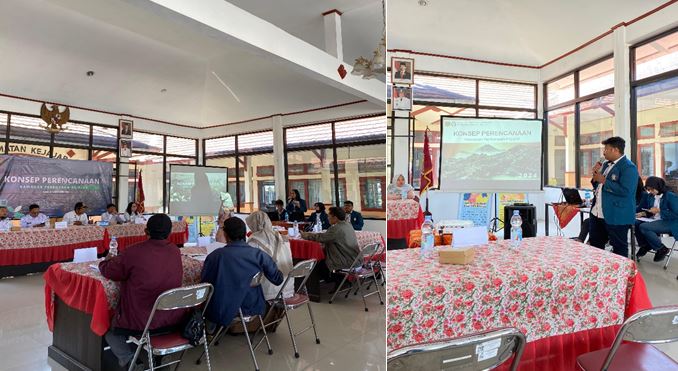Wonosobo: Students from the Spatial Planning and Land Management Study Program have presented the concept of planning for the Kejajar Urban Area with the vision of “Realizing the Kejajar Sub-district Urban Area as a Sustainable and Competitive Ecotourism Area.” This activity occurred in the Kejajar Sub-district Office Meeting Hall, Wonosobo, on Wednesday, November 6, 2024, from 09.30 to 12.30 WIB. The Secretary of the Kejajar Sub-district attended this event, Mr. Sri Isman Hartowo, S.STP; the Head of the Economic and Development Section, Mr. Musadad, SE; village and sub-district heads, as well as three lecturers and 17 students from the Spatial Planning and Land Management Study Program. A total of 27 participants participated in the activity, which is part of an effort to support the development of urban areas with local potential and needs. This activity began with an opening by the MC, followed by a prayer and singing of the national anthem, Indonesia Raya. After that, the Spatial Planning and Land Management Study Program profile was presented as an introduction before starting the main discussion. The opening remarks were delivered by representatives of the Kejajar Sub-district Head and the students’ supervisors.
The event then continued with a core presentation on issues, goals, targets, and planning concepts for the Kejajar Urban Area. The event was closed with an interactive Q&A session and a planning concept map submission to the sub-district as material for discussion and follow-up. In their presentations, students emphasized the importance of making the Kejajar Sub-district a sustainable and competitive ecotourism area. This concept combines local economic development with environmental conservation while strengthening the area’s competitiveness as a leading tourist destination. Students presented several main issues that are the basis for compiling this planning concept, including natural disaster vulnerability, land use, ecotourism potential, and infrastructure. The Q&A session produced various suggestions and inputs that enriched the planning concept that had been prepared. In the proposed concept, students proposed the development of the Kejajar Urban Area through an ecotourism approach that focuses on environmental management, local economic development, infrastructure improvement, and disaster risk management. The results of this discussion will be used as recommendation material submitted to the Wonosobo Regency PUPR to consider local potential, issues, and needs. Students are also committed to involving all stakeholders in refining this concept. “Through this activity, we learned about the importance of collaboration between academics, government, and the community in developing a holistic development plan,” said one of the student representatives. With the prepared concept, Kejajar District is expected to develop as an urban area that is not only ecologically sustainable but also economically competitive. The involvement of the community and other stakeholders is key to realizing this vision. This activity provides valuable lessons about the importance of participatory and data-based planning for inclusive and sustainable development. The success of this presentation is a positive first step towards developing the Kejajar Urban Area as a leading ecotourism area in the future.

